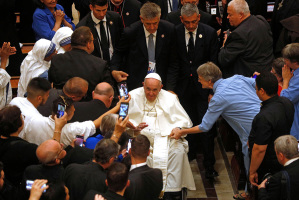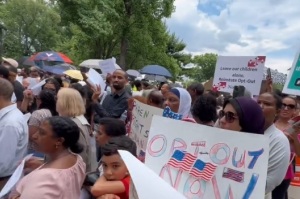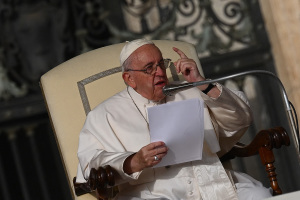Supreme Court Asked to Intervene in Defense of Marriage Act Ruling
The ongoing legal battle to uphold the Defense of Marriage Act (DOMA) has been appealed to the Supreme Court, leaving both opponents and supporters of same-sex marriage wondering how marriage on a federal level might be affected.
Lawyers for the House of Representatives chose to challenge the Defense of Marriage Act (DOMA) ruling through the Supreme Court after the First Circuit Court of Appeals in Boston ruled on May 31 that the Section 3 provision of DOMA, a federal law created in 1996, was unconstitutional.
DOMA states that marriage is between a man and woman. The Section 3 provision, which was ruled unconstitutional, prohibits the federal government from providing equal protection and federal benefits to same-sex couples and heterosexual couples.
Now, the House of Representatives' attorneys, under the Bipartisan Legal Advisory Group (BLAG), are appealing the ruling to the Supreme Court, arguing that individual states should be able to have sovereignty to define marriage as it chooses, and the federal government reserves to right to make its independent decisions as well.
"Section 3 of DOMA simply asserts the federal government's right as a separate sovereign to provide its own definition which 'governs only federal programs and funding,'" BLAG wrote in its request for appeal, as reported by The Baptist Press.
"Congress, of course, did not invent the meanings of 'marriage' and 'spouse' in 1996. Rather, DOMA merely reaffirmed and codified the traditional definition of marriage, i.e., what Congress itself has always meant – and what courts and the executive branch have always understood it to mean," the group added.
The Gay and Lesbian Alliance Against Defamation league (GLAAD), along with the state of Massachusetts, filed the initial lawsuit questioning the constitutionality of the Act and won in Boston's Circuit Court of Appeals.
GLAAD argues that the provision is unconstitutional because it does not reward federal benefits to same-sex couples, even if those couples are married in states where same-sex marriage is legal.
Boston's First Circuit Court of Appeals determined that Congress did not provide "adequate rationale" for denying federal benefits to married same-sex couples in states where same-sex marriage is legal.
After the initial appeal's ruling in late May, Alliance Defense Fund Legal Counsel Dale Schowengerdt argued that the court went too far in determining Congress's rationale.
"In allowing one state to hold the federal government, and potentially other states, hostage to redefine marriage, the 1st Circuit attempts a bridge too far. Under this rationale, if just one state decided to accept polygamy, the federal government and perhaps other states would be forced to accept it, too," he said.
DOMA, signed by Bill Clinton in 1996, is two-fold: first, it argues that states that do not recognize same-sex marriage would not be forced to recognize the same-sex marriage of out-of-state residents. Secondly, DOMA argues that federal law would not recognize same-sex marriage.
The Boston appeals court upheld the first provision of DOMA, and found the second to be unconstitutional.
Should the Circuit Court's ruling be upheld in the Supreme Court appeals process, the U.S. will likely be forced to permit same-sex marriage on a federal level.





























